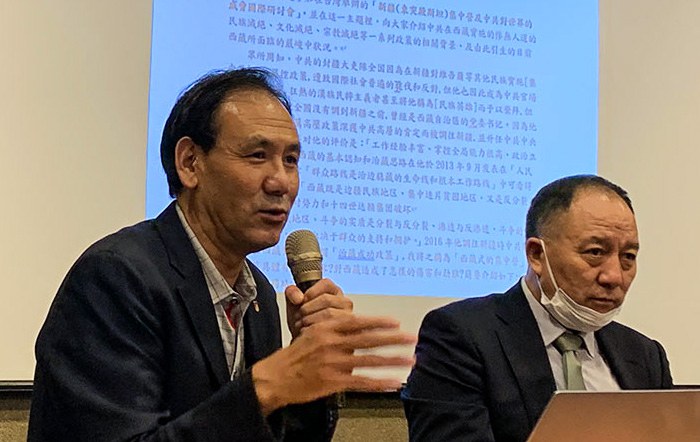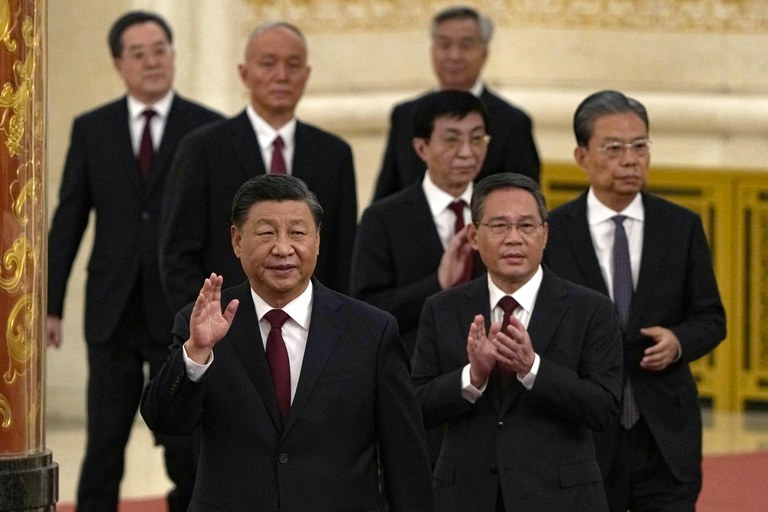Fed up with COVID lockdowns, migrant workers in Guangzhou break through barriers
Migrat workers whose movements have been restricted by rolling lockdowns and compulsory COVID-19 testing under China’s strict zero-COVID policy have taken to the streets of the southern province of Guangdong in recent days, according to video clips uploaded to social media. One video clip reportedly shot in Haizhu district of the provincial capital Guangzhou on Monday night showed hundreds of people surging along a street, shoving over traffic barriers and arguing with police and disease prevention personnel in protective gear. It was the latest outpouring of resentment in China over restrictions aimed at containing the spread of the virus. In another clip posted to Twitter, people are shown smashing barriers before flinging what appear to be plastic crates at workers and officials in protective gear, while a woman exclaims from behind the camera: “Wow, that’s going too far! So scary!” Dissatisfaction with the frequent lockdowns was the main reason driving the protests, said a man who gave only his name as Xu. “They’d been locked up so long and couldn’t do business, and so they just rushed out,” he told Radio Free Asia. “Last night a ton of people broke through the quarantine barricades. Seems like special police were sent in,” he said. “I don’t know how many people were there.” Xu said people have been locked up for weeks in areas where the protests broke out. Long-term closure and inability to work, coupled with insufficient supplies, were the main reasons for people’s protests. Local authorities did not respond to requests for comment. In another video, dozens of people face off in an alleyway with dozens of disease control personnel and police across fallen traffic barriers, before the camera pans to show police holding down a man restrained by cable ties with a foot on his neck. Footage sent to Radio Free Asia showed hundreds of people running along two different streets, trampling traffic barriers and shouting, while another shot showed hundreds standing still and facing off near a COVID-19 testing station, with some people pushing over barriers. ‘Love of freedom’ And in a clip sent to RFA’s Cantonese Service, people apparently confined to apartment buildings in Guangzhou sing the anthem of the 2014 Hong Kong pro-democracy movement, “Boundless Oceans, Vast Skies,” by Hong Kong rock band Beyond, to the night sky. “Forgive me, my whole life I’ve had a love of freedom,” the crowd sings in Cantonese, the lingua franca of both Guangdong and Hong Kong. Chinese media outlet Interface News reported that the protests had prompted local leaders to hold an emergency meeting on Monday night to tweak the way the zero-COVID policies are being enforced. The Guangdong province health commission said via its official WeChat account on Tuesday that “adjustments” would be needed to local policies, slashing quarantine periods from seven days at a quarantine camp plus three days observation at home to five days in quarantine and three days at home. Local officials must arrange for the “timely release” of people once their quarantine and home isolation periods are completed and the necessary negative tests completed, the commission said. Local officials should avoid being overly rigid in enforcing restrictions, and do a good job of preventing and responding to risks, the statement said. China’s health ministry reported 17,772 new locally COVID-19 cases on Monday, including 1,621 confirmed cases and 16,151 asymptomatic infections, the biggest spike since late April. Of those, 5,633 new locally transmitted infections were in Guangdong. Two sub-districts of Haizhu district have been locked down, including Liwan and Panyu. Translated and written by Luisetta Mudie, edited by Malcolm Foster.





